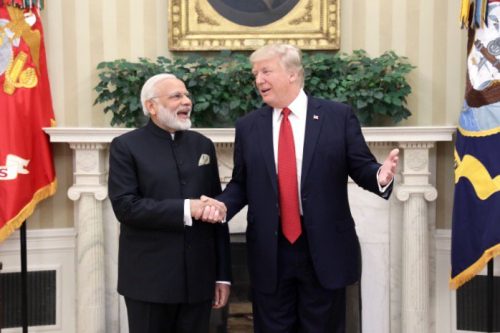 Propaganda thrives in times of conflict, and in this ongoing battle of perceptions between India and China amid the weeks-long standoff at the Sikkim border, sections of China’s state-controlled media have launched a verbal blitzkrieg, accusing India of sinister motives and peddling the government’s line. The latest salvo from The Global Times, a notoriously hawkish nationalist tabloid, has a conspiratorial ring and blames the United States for interfering and benefiting from the India-China standoff.
Propaganda thrives in times of conflict, and in this ongoing battle of perceptions between India and China amid the weeks-long standoff at the Sikkim border, sections of China’s state-controlled media have launched a verbal blitzkrieg, accusing India of sinister motives and peddling the government’s line. The latest salvo from The Global Times, a notoriously hawkish nationalist tabloid, has a conspiratorial ring and blames the United States for interfering and benefiting from the India-China standoff.
“More than five weeks into the border standoff between China and India, some countries other than the two directly involved are trying to step in,” said the Global Times in a hard-hitting article, in an apparent reference to the US and Australia.
Titled “Instigating Sino-India confrontation won’t benefit US,” the article alluded to commentaries in the US media calling on Washington to provide to support India to “deter and counter” China and mobilise the world against Beijing. The article targeted Australian Foreign Minister Julie Bishop for her remarks, during her recent visit to India, about resolving the Doka La issue peacefully. “Bishop intends to blur the nature of the face-off and shows disguised support for India.”
South China Sea trick?
Alluding to the US’ so-called South China Sea trick, the article warned Washington to stop indulging in such tactics. “The Americans may think they can copy their South China Sea trick. But what did the US get from the maritime disputes? Likewise, Washington won’t get any benefits from the escalation of the Sino-India confrontation. China won’t give up safeguarding its territory because of US interference,” the article said.
“There are certain forces in the West that are instigating a military clash between China and India, from which they can seek strategic benefits at no cost to themselves. Washington applied this scheme in the South China Sea disputes,” it said.
Dangers of propaganda overkill
 Ever since India sent its troops to prevent Chinese troops from building a road through the disputed Dokalam plateau along the Sikkim border over five weeks ago, the Global Times and other state-controlled media outfits have constantly reinforced the Chinese government’s spin about India trespassing into the Chinese territory, and has been relentlessly issuing threatening messages to India, warning of a repeat of the 1962 war in which China humiliated India and occupied large swathes of the Indian territory. Such propaganda blitz, however, hasn’t cut much ice in the international community, with India’s External Affairs Minister Sushma Swaraj telling parliament a few days ago that the world is with India in the wake of the Doka La stand-off.
Ever since India sent its troops to prevent Chinese troops from building a road through the disputed Dokalam plateau along the Sikkim border over five weeks ago, the Global Times and other state-controlled media outfits have constantly reinforced the Chinese government’s spin about India trespassing into the Chinese territory, and has been relentlessly issuing threatening messages to India, warning of a repeat of the 1962 war in which China humiliated India and occupied large swathes of the Indian territory. Such propaganda blitz, however, hasn’t cut much ice in the international community, with India’s External Affairs Minister Sushma Swaraj telling parliament a few days ago that the world is with India in the wake of the Doka La stand-off.
Besides, propaganda, no matter how colourful and forceful verbal accusations are, is no substitute for cool and patient reasoning, which is badly needed to prevent India-China relations from spinning out of control.
Author Profile
- India Writes Network (www.indiawrites.org) is an emerging think tank and a media-publishing company focused on international affairs & the India Story. Centre for Global India Insights is the research arm of India Writes Network. To subscribe to India and the World, write to editor@indiawrites.org. A venture of TGII Media Private Limited, a leading media, publishing and consultancy company, IWN has carved a niche for balanced and exhaustive reporting and analysis of international affairs. Eminent personalities, politicians, diplomats, authors, strategy gurus and news-makers have contributed to India Writes Network, as also “India and the World,” a magazine focused on global affairs.
Latest entries
 In ConversationJuly 26, 2024India-Italy defence collaboration can extend to third countries: Anil Wadhwa
In ConversationJuly 26, 2024India-Italy defence collaboration can extend to third countries: Anil Wadhwa In ConversationJuly 23, 2024Italy views India as a key partner in Indo-Pacific: Vani Rao
In ConversationJuly 23, 2024Italy views India as a key partner in Indo-Pacific: Vani Rao DiplomacyJune 29, 2024First BRICS unveils a roadmap for boosting tourism among emerging economies
DiplomacyJune 29, 2024First BRICS unveils a roadmap for boosting tourism among emerging economies India and the WorldJune 11, 2024On Day 1, Jaishankar focuses on resolving standoff with China
India and the WorldJune 11, 2024On Day 1, Jaishankar focuses on resolving standoff with China






